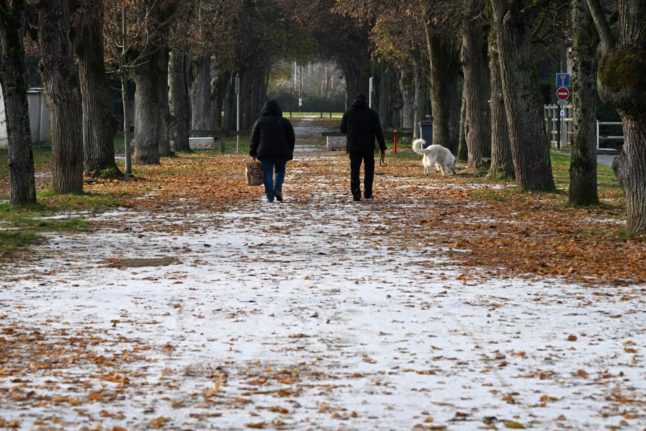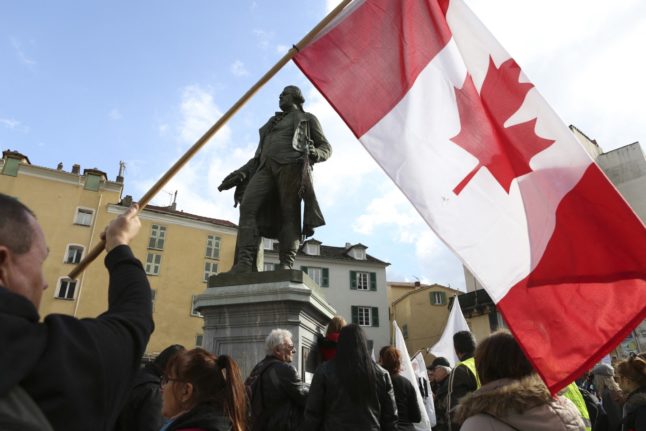All countries have their own – usually unwritten – code when it comes to small-talk, from Scandinavian countries where exchanging pleasantries with strangers is regarded with deep suspicion to the USA where perky chat is practically compulsory with a wide range of people.
When it comes to small-talk, France lies somewhere in the middle – it’s not weird to offer a bit of chat with someone you don’t know, but the context has to be right.
Greetings
What France definitely does do, a lot, is greetings – it’s regarded as rude to start any interaction, even buying a baguette in the bakery, without a bonjour (or bonsoir if it’s evening).
You’ll be expected to greet people in a wide range of scenarios, from ordering in a shop or café to getting into an elevator and even walking into a doctor’s waiting room.
Explained: When you should greet people in France
However, the exchange of greetings does not necessarily mean it’s time to start small-talk – in the scenario of a crowded elevator for example, you would normally just exchange bonjours when you get in, and then add a bonne-journée (have a nice day) as people leave. No further chat is required or expected.
Ca va
One thing to note is that ça va – which you’ll likely be taught in school – is not a greeting.
It means ‘how are you’ or ‘are you OK’ and it’s a genuine question and is reserved for people that you know – in addition to friends, you might add a ça va after your bonjour to colleagues, neighbours or acquaintances. If someone has asked if you are fine, it’s polite to ask them back.
It’s a reasonably casual phrase, so if you’re meeting the bank manager you wouldn’t chuck in a ça va.
There are two ways to use ça va – the first is in passing, usually for people who don’t really know and who you’re not trying to start a conversation with.
In that case it goes
Ca va ?
Ca va. Ca va ?
Ca va.
You’ve both asked each other if you are fine, been told that you are fine and then the conversation ends;
If you want to start more of a chat with a person who has asked you ça va ? you can reply how you are in a little more detail and then ask Et toi ? (and you?).
Starting small talk
So when is it OK to start small talk? As in most countries, it depends on the situation and although there are always exceptions a general rule is that small talk is more likely to happen in villages or smaller towns than it is in big cities.
In a city it’s obviously impractical to greet everyone you see walking on the street, but you could try to chat with your neighbours in common areas (assuming you live in an apartment building).
In a village on the other hand, it’s normal to greet someone with a bonjour as they go past on the street, even if you don’t know them.
Likewise if you’re in a village or a small town it’s likely that small-talk will be exchanged in the shop, the bakery or the bar. You’re also far more likely to chat to your neighbours, who maybe become friends.
The international code of dog-walkers also applies – two people walking dogs can greet each other and exchange compliments about each other’s dogs.
You might also do some small-talk in a bar or restaurant, at the hairdresser’s or in a taxi.
As in most countries, a bit of chat – often about holidays – is normal at the hairdressers, some taxi drivers like to chat (or rant about their preferred political theories) while some do not and it’s the same in a bar or restaurant – if you’re in an establishment that is run by the owner they will often come and make recommendations that can develop into a chat.
If you are a parent, small talk in the school pick-up/drop-off area is also appropriate.
READ MORE: Crèche to cafés: How to make friends with other parents in France
What to talk about?
So what’s considered a safe subject for small-talk in France? Firstly, beware of getting too personal – French people, especially of the older generation, can be quite reserved and you wouldn’t start asking personal questions of someone who have only just met or don’t know well.
Then there are the taboo topics – money, religion and sex – which should be saved for people you know well.
Just as in England, the weather is a safe topic and if you’re in a village there are all sorts of general subjects to discuss – the upcoming fête, the state of the bus service and when the high-speed broadband might be coming (soon – it’s always ‘soon’).
Another safe topic is a bit of gentle complaining, in fact some French people will admit that their habit of complaining is just another form of small-talk – if you’re talking to a colleague you don’t know well or a neighbour then complaining about the weather, public transport, the latest strike, the fact the coffee machine isn’t working again are all good, safe topics.
Another easy topic for foreigners in France is to ask questions – most French people are happy to explain things about their country to outsiders – why is November 1st a holiday, when does bonjour become bonsoir and what’s the cake with the gold paper crown on it all make for good ice-breakers.
Pick-ups
The other scenario when you might be chatting with someone you don’t know is if someone is attempting to chat you up.
It’s not uncommon in France to be approached in a bar, café, bookstore or even the street by someone who likes the look of you and wants to start a conversation. If you’re not interested just politely say no and move on – if you like the look of them you could try one of these (cheesy) chat-up lines.



 Please whitelist us to continue reading.
Please whitelist us to continue reading.
Member comments